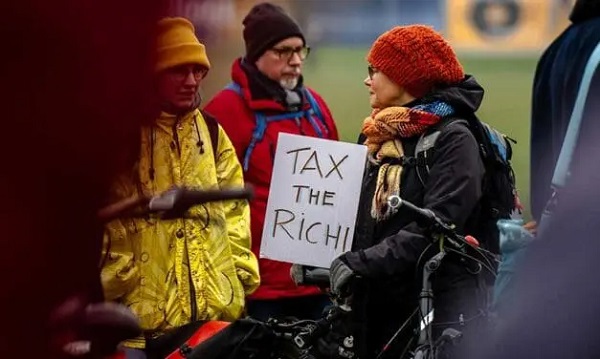Uncategorized
Trump’s border visit comes as shutdown talks fall apart

WASHINGTON — President Donald Trump is taking the shutdown battle to the U.S.-Mexico border, seeking to bolster his case for the border wall after negotiations with Democrats blew up over his funding demands.
Trump stalked out of his meeting with congressional leaders — “I said bye-bye,” he tweeted soon after — as efforts to end the partial government shutdown fell into deeper disarray. Hundreds of thousands of federal workers now face lost paychecks on Friday.
During his stop Thursday in McAllen, Texas, Trump will visit a border patrol station for a roundtable on immigration and border security, and will get a security briefing on the border. But Trump has expressed his own doubts that his appearance and remarks will change any minds, as he seeks $5.7 billion for the wall that has been his signature promise since his presidential campaign.
McAllen is located in the Rio Grande Valley, the busiest part of the border for illegal border crossings.
The unraveling talks prompted further speculation about whether Trump would declare a national emergency and try to authorize the wall on his own if Congress won’t approve the money he’s seeking.
“I think we might work a deal, and if we don’t I might go that route,” he said.
The White House meeting in the Situation Room ended after just 14 minutes. Democrats said they asked Trump to re-open the government but that he told them if he did they wouldn’t give him money for the wall. Republicans said Trump posed a direct question to House Speaker Nancy Pelosi: If he opened the government, would she fund the wall? She said no.
Senate Democratic leader Chuck Schumer said Trump slammed his hand on the table. However, Republicans said Trump, who handed out candy at the start of the meeting, did not raise his voice and there was no table pounding.
One result was certain: The shutdown plunged into new territory with no endgame in sight. The Democrats see the idea of the long, impenetrable wall as ineffective and even immoral. Trump sees it as an absolute necessity to stop what he calls a crisis of illegal immigration, drug-smuggling and human trafficking at the border.
Trump headed to Capitol Hill earlier Wednesday, seeking to soothe jittery Republican lawmakers. He left a Republican lunch boasting of “a very, very unified party,” but GOP senators have been publicly uneasy as the standoff ripples across the lives of Americans and interrupts the economy.
During the lunch, Trump discussed the possibility of a sweeping immigration compromise with Democrats to protect some immigrants from deportation but provided no clear strategy or timeline for resolving the standoff, according to senators in the private session.
GOP unity was tested further when the House passed a bipartisan spending bill, 240-188, to reopen one shuttered department, Treasury, to ensure that tax refunds and other financial services continue. Eight Republicans joined Democrats in voting, defying the plea to stick with the White House.
There was growing concern about the toll the shutdown is taking on everyday Americans, including disruptions in payments to farmers and trouble for home buyers who are seeking government-backed mortgage loans — “serious stuff,” according to Sen. John Thune of South Dakota, the No. 2 Senate Republican.
Some Republicans were concerned about the administration’s talk of possibly declaring a national emergency at the border, seeing that as an unprecedented claim on the right of Congress to allocate funding except in the most dire circumstances.
“I prefer that we get this resolved the old-fashioned way,” Thune said.
Democrats said before the White House meeting that they would ask Trump to accept an earlier bipartisan bill that had money for border security but not the wall. Pelosi warned that the effects of hundreds of thousands of lost paychecks would begin to have an impact across the economy.
“The president could end the Trump shutdown and re-open the government today, and he should,” Pelosi said.
Tuesday night, speaking to the nation from the Oval Office for the first time, Trump argued that the wall was needed to resolve a security and humanitarian “crisis.” He blamed illegal immigration for what he said was a scourge of drugs and violence in the U.S. and asked: “How much more American blood must we shed before Congress does its job?”
Democrats in response accused Trump appealing to “fear, not facts” and manufacturing a border crisis for political gain.
In an off-the-record lunch with television anchors ahead of his speech, Trump suggested his aides had pushed him to give the address and travel to the border and that he personally did not believe either would make a difference, according to two people familiar with the meeting. But one person said it was unclear whether Trump was serious or joking. The people familiar with the meeting insisted on anonymity because they were not authorized to discuss the meeting publicly.
___
Associated Press writers Jill Colvin, Colleen Long, Alan Fram and Deb Riechmann contributed to this report.
For AP’s complete coverage of the U.S. government shutdown: https://apnews.com/GovernmentShutdown
Catherine Lucey, Lisa Mascaro And Laurie Kellman, The Associated Press
Uncategorized
Cost of bureaucracy balloons 80 per cent in 10 years: Public Accounts

The cost of the bureaucracy increased by $6 billion last year, according to newly released numbers in Public Accounts disclosures. The Canadian Taxpayers Federation is calling on Prime Minister Mark Carney to immediately shrink the bureaucracy.
“The Public Accounts show the cost of the federal bureaucracy is out of control,” said Franco Terrazzano, CTF Federal Director. “Tinkering around the edges won’t cut it, Carney needs to take urgent action to shrink the bloated federal bureaucracy.”
The federal bureaucracy cost taxpayers $71.4 billion in 2024-25, according to the Public Accounts. The cost of the federal bureaucracy increased by $6 billion, or more than nine per cent, over the last year.
The federal bureaucracy cost taxpayers $39.6 billion in 2015-16, according to the Public Accounts. That means the cost of the federal bureaucracy increased 80 per cent over the last 10 years. The government added 99,000 extra bureaucrats between 2015-16 and 2024-25.
Half of Canadians say federal services have gotten worse since 2016, despite the massive increase in the federal bureaucracy, according to a Leger poll.
Not only has the size of the bureaucracy increased, the cost of consultants, contractors and outsourcing has increased as well. The government spent $23.1 billion on “professional and special services” last year, according to the Public Accounts. That’s an 11 per cent increase over the previous year. The government’s spending on professional and special services more than doubled since 2015-16.
“Taxpayers should not be paying way more for in-house government bureaucrats and way more for outside help,” Terrazzano said. “Mere promises to find minor savings in the federal bureaucracy won’t fix Canada’s finances.
“Taxpayers need Carney to take urgent action and significantly cut the number of bureaucrats now.”
Table: Cost of bureaucracy and professional and special services, Public Accounts
| Year | Bureaucracy | Professional and special services |
|
$71,369,677,000 |
$23,145,218,000 |
|
|
$65,326,643,000 |
$20,771,477,000 |
|
|
$56,467,851,000 |
$18,591,373,000 |
|
|
$60,676,243,000 |
$17,511,078,000 |
|
|
$52,984,272,000 |
$14,720,455,000 |
|
|
$46,349,166,000 |
$13,334,341,000 |
|
|
$46,131,628,000 |
$12,940,395,000 |
|
|
$45,262,821,000 |
$12,950,619,000 |
|
|
$38,909,594,000 |
$11,910,257,000 |
|
|
$39,616,656,000 |
$11,082,974,000 |
Uncategorized
Trump Admin Establishing Council To Make Buildings Beautiful Again


From the Daily Caller News Foundation
By Jason Hopkins
The Trump administration is creating a first-of-its-kind task force aimed at ushering in a new “Golden Age” of beautiful infrastructure across the U.S.
The Department of Transportation (DOT) will announce the establishment of the Beautifying Transportation Infrastructure Council (BTIC) on Thursday, the Daily Caller News Foundation exclusively learned. The BTIC seeks to advise Transportation Secretary Sean Duffy on design and policy ideas for key infrastructure projects, including highways, bridges and transit hubs.
“What happened to our country’s proud tradition of building great, big, beautiful things?” Duffy said in a statement shared with the DCNF. “It’s time the design for America’s latest infrastructure projects reflects our nation’s strength, pride, and promise.”
“We’re engaging the best and brightest minds in architectural design and engineering to make beautiful structures that move you and bring about a new Golden Age of Transportation,” Duffy continued.
Mini scoop – here is the DOT’s rollout of its Beautifying Transportation Infrastructure Council, which will be tasked with making our buildings beautiful again. pic.twitter.com/
9iV2xSxdJM — Jason Hopkins (@jasonhopkinsdc) October 23, 2025
The DOT is encouraging nominations of the country’s best architects, urban planners, artists and others to serve on the council, according to the department. While ensuring that efficiency and safety remain a top priority, the BTIC will provide guidance on projects that “enhance” public areas and develop aesthetic performance metrics.
The new council aligns with an executive order signed by President Donald Trump in August 2025 regarding infrastructure. The “Making Federal Architecture Beautiful Again” order calls for federal public buildings in the country to “respect regional architectural heritage” and aims to prevent federal construction projects from using modernist and brutalist architecture styles, instead returning to a classical style.
“The Founders, in line with great societies before them, attached great importance to Federal civic architecture,” Trump’s order stated. “They wanted America’s public buildings to inspire the American people and encourage civic virtue.”
“President George Washington and Secretary of State Thomas Jefferson consciously modeled the most important buildings in Washington, D.C., on the classical architecture of ancient Athens and Rome,” the order continued. “Because of their proven ability to meet these requirements, classical and traditional architecture are preferred modes of architectural design.”
The DOT invested millions in major infrastructure projects since Trump’s return to the White House. Duffy announced in August a $43 million transformation initiative of the New York Penn Station in New York City and in September unveiledmajor progress in the rehabilitation and modernization of Washington Union Station in Washington, D.C.
The BTIC will comprise up to 11 members who will serve two-year terms, with the chance to be reappointed, according to the DOT. The task force will meet biannually. The deadline for nominations will end Nov. 21.
-

 Business2 days ago
Business2 days agoCarney’s Toronto cabinet meetings cost $530,000
-

 Bruce Dowbiggin2 days ago
Bruce Dowbiggin2 days agoIntegration Or Indignation: Whose Strategy Worked Best Against Trump?
-

 Artificial Intelligence2 days ago
Artificial Intelligence2 days agoAI is accelerating the porn crisis as kids create, consume explicit deepfake images of classmates
-

 MAiD2 days ago
MAiD2 days ago101-year-old woman chooses assisted suicide — press treats her death as a social good
-

 Health2 days ago
Health2 days ago23,000+ Canadians died waiting for health care in one year as Liberals pushed euthanasia
-

 espionage2 days ago
espionage2 days agoDigital messages reportedly allege Chinese police targeted dissident who died suspiciously near Vancouver
-

 International2 days ago
International2 days agoFBI may have finally nabbed the Jan. 6 pipe bomber
-

 Health2 days ago
Health2 days agoNews RFK Jr.’s vaccine committee to vote on ending Hepatitis B shot recommendation for newborns










